完备版版高考英语短文改错介词考点.doc
英语高考专题复习短文改错.doc
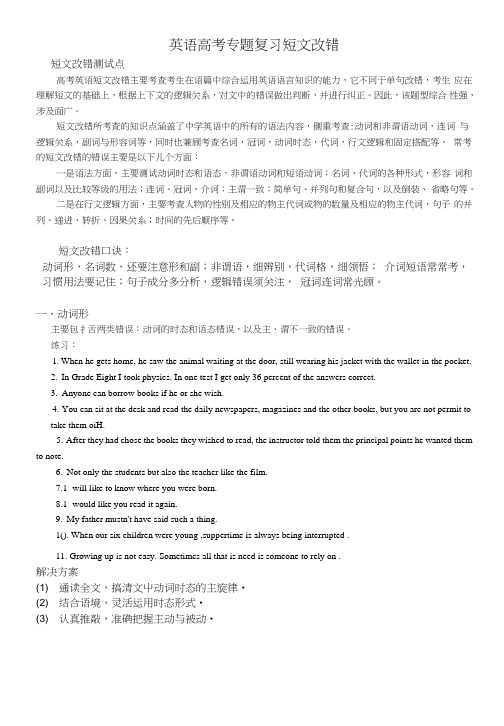
英语高考专题复习短文改错短文改错测试点高考英语短文改错主要考查考生在语篇中综合运用英语语言知识的能力,它不同于单句改错,考生应在理解短文的基础上,根据上下文的逻辑关系,对文中的错误做出判断,并进行纠正。
因此,该题型综合性强,涉及面广。
短文改错所考查的知识点涵盖了中学英语中的所有的语法内容,侧重考查:动词和非谓语动词,连词与逻辑关系,副词与形容词等,同时也兼顾考查名词,冠词,动词时态,代词,行文逻辑和固定搭配等。
常考的短文改错的错误主要是以下儿个方面:一是语法方面,主要测试动词时态和语态,非谓语动词和短语动词;名词、代词的各种形式,形容词和副词以及比较等级的用法;连词、冠词、介词;主谓一致;简单句、并列句和复合句,以及倒装、省略句等。
二是在行文逻辑方面,主要考查人物的性别及相应的物主代词或物的数量及相应的物主代词,句子的并列、递进、转折、因果关系;时间的先后顺序等。
短文改错口诀:动词形,名词数,还要注意形和副;非谓语,细辨别,代词格,细领悟;介词短语常常考,习惯用法要记住;句子成分多分析,逻辑错误须关注,冠词连词常光顾。
一、动词形主要包扌舌两类错误:动词的时态和语态错误,以及主、谓不一致的错误。
练习:1.When he gets home, he saw the animal waiting at the door, still wearing his jacket with the wallet in the pocket.2.In Grade Eight I took physics. In one test I get only 36 percent of the answers correct.3.Anyone can borrow books if he or she wish.4.You can sit at the desk and read the daily newspapers, magazines and the other books, but you are not permit totake them oiH.5.After they had chose the books they wished to read, the instructor told them the principal points he wanted them to note.6.Not only the students but also the teacher like the film.7.1will like to know where you were born.8.1would like you read it again.9.My father mustn't have said such a thing.1(). When our six children were young ,suppertime is always being interrupted .11. Growing up is not easy. Sometimes all that is need is someone to rely on .解决方案(1) 通读全文,搞清文屮动词时态的主旋律•(2) 结合语境,灵活运用时态形式•(3) 认真推敲,准确把握主动与被动•[考点剖析]此类题的错误设置一般包括以下几个方面:(1) 短文屮时态的使用前后不一致。
高考英语短文改错知识点.doc
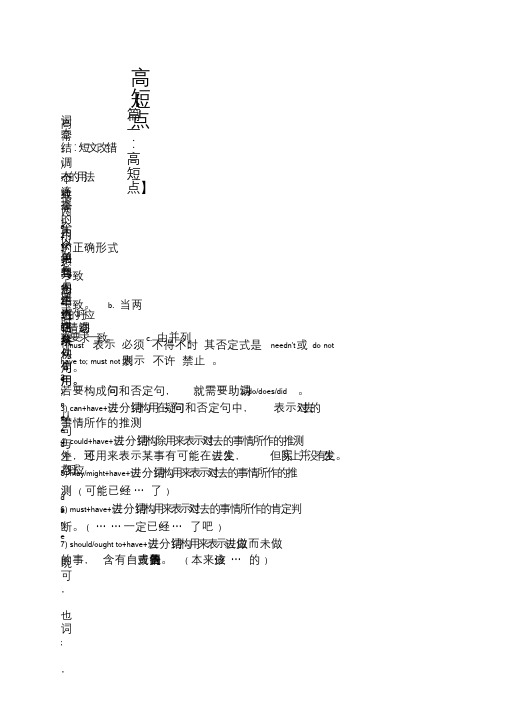
高短点 【篇一:高短点】 高常结:短文改错 词态 1)态的用法 调一致 a .单句态一致。
b. 当两 个或两个以语共用一时态要求一致。
c. 由并列 连接的两个句态上要求一致。
d . 从句与主态呼应 态 1用 2的正确形式 3态与句中态的呼应 3一致 气 1语气在条件2语从句用。
3语气从句用。
5.情态动词 1)must 表示 必须, 不得不时, 其否定式是 needn ’t 或 do not have to; must not 则表示 不许, 禁止 。
2)n e e d 与 d ar e 既可,也词;, 若要构成问句和否定句, 就需要助动词do/does/did 。
3) can+have+过去分词结构用在疑问句和否定句中, 表示对过去的 事情所作的推测 4) could+have+过去分词结构除用来表示对过去的事情所作的推测 外,还可用来表示某事有可能在过去发生, 但实际上并没有发生。
5) may/might+have+过去分词结构用来表示对过去的事情所作的推 测。
( 可能已经⋯ ⋯ 了 ) 6) must+have+过去分词结构用来表示对过去的事情所作的肯定判 断。
( ⋯ ⋯ 一定已经⋯ ⋯ 了吧 ) 7) should/ought to+have+过去分词结构用来表示过去应做而未做 的事, 含有自责或责备的语气。
( 本来应该⋯ ⋯ 的 )8) need not+have+过去分词结构用来表示过去做了没有必要做的事。
( 本来不必⋯⋯的)6.谓语结构(缺少谓语)7.固定结构例:(nmet04i)can you tell me about what i should do? 【去掉about 】8.非谓语动词1)不定式的主被动形式的误用2)不定式与v-ing 的误用3)形式主语、形式宾语it 的误用4)had better, would rather than 等词的后面只跟不带t o 的不定式。
高考英语短文改错考点解析介词汇编

学习-----好资料高考英语短文改错考点解析:介词一、考点规律分析短文改错对介词的考查主要涉及在及物动词后接宾语时误加介词和在不及物动词后接宾语时漏加介词、可直接用作状语的副词短语前误加介词、介词与其他词的常用搭配、常用介词的基本用法、习语中的介词用法等。
二、真题单句归纳(1)Bill insisted in staying near the car. (in 改为on,insist on 为固定搭配)(全国卷)(2)Suddenly we caught sight at a car and some men. (at 改为of,catch sight of是习语,意为“看见”)(全国卷)(3)When I have free time I go a long walk. (go 后加for,go for a walk 是习语)(全w.w.w.k.s.5.u.c.o.m国卷)(4)When they came down the police were angry to them. (to 改为with,要表示对某人生气,英语习惯上用be angry with sb)(全国卷)(5)Most people can quickly get for help from a doctor or go to a hospital since they are ill.(去掉for,因其前的get 是及物动词)(全国卷)(6)…and some books,for example,books for history,science,cooking andgardening are also popular. (books for 改为books on,此处的on 意为“关于”)(全国卷)(7)I never knew about a ride down a river could be so exciting. (去掉about 或将about改为that,因动词knew 后可直接跟宾语从句,无需用介词)(全国卷)(8)It was very kind for them to meet me at the railway station. (for 改为of,注意句型It‘s kind of sb to do sth)(全国卷)(9)In fact,they are planning to visit China in next year. (去掉in,在由next,this,last 等构成的时间短语中,一般可直接用作时间状语,无需加in,on,at 这样的介词)(全国卷)(10)We practise for three times every week. (去掉for,在表示频率的名词前通常不w.w.w.k.s.5.u.c.o.m(全国卷)加介词)(11)We must keep in mind that we play for the team instead ourselves. (instead 后加of,instead of 为复合介词,在此表示“而不是”)(全国卷)更多精品文档.学习-----好资料(12)Unfortunately,there are too many people among my family. (among 改为in,in my family 意为“在我家里”)(全国卷)(13)I was happy with any programme but the others spent a lot time arguing…(a lot 后加of,因a lot 不能直接修饰名词)(全国卷)(14)Thanks very much on inviting me to your birthday party on Sunday. (on 改为for,thanks for doing sth 意为“因某事而感谢某人”)(北京春季卷)(15)So I‘m really sorry that I won't be able to come in this time. (去掉in,因this time可直接用作状语)(北京春季卷)(16)…but we do not seem to get much time to talk about together. (去掉about,因about 后没有接宾语,about 属多余)(全国卷)(17)For instance,on one night he played strong and loud music till four o‘clock in the morning. (去掉on,因one night 可直接用作状语)(北京春季卷)(18)I was so tired that I fell asleep at the moment my head touched the pillow. (去掉at,w.w.w.k.s.5.u.c.o.m(全国卷))the moment 在此用作连词,相当于as soon as(19)His parents asked him to spend in more time preparing for the college entranceexamination. (去掉in,spend 是及物动词,其后可直接跟名词作宾语)(安徽春季卷)(20)I feel sorry to him. (to 改为for,be / feel sorry for sb 意为“为某人感到难过”)(安徽春季卷)(21)Because so much viewing,children may not develop the habit of reading and theability to enjoy themselves. (Because 后加of,因so much viewing 相当于名词)(北京春季卷)(22)On one year the average child will see 25,000 television commercials…(On 改为In,意为“在一年中”)(北京春季卷)(23)The main problem was in that I always thought in Chinese…(去掉that 前的in,was 后是一个以that 引导的宾语从句,in 是多余的)(全国卷)(24)I‘m sure they will laugh to me and see me as a fool. So I feel unhappy every day.w.w.w.k.s.5.u.c.o.m)(全国卷)laugh at 意为“嘲笑”at(to 改为,(25)You can find all kinds information in just a few minutes on the Internet. (kinds 后加of,a kind of 意为“一种……”,all kinds of…意为“各种各样的……”)(广西卷)更多精品文档.学习-----好资料(26)But I have spent lots my money,…(lots后加of,lots / a lot后不能接名词;后接名词时,要用lots of…,a lot of…)(四川卷)(27)…you will probably want to join in the Stamp Collectors‘Club…(去掉in,表示“参加,加入”某个组织,join 后不要再加介词in;表示“参加”某项活动时,才加in)(浙江卷)(28)We have a lot on common and have a lot to talk about. (on 改为in,因为have sthin common 是固定搭配,意为“有共同的……”)(福建卷)w.w.w.k.s.5.u.c.o.m三、模拟单句演练(1)We must serve for the people heart and soul. (2)I followed the man for a while,and saw him enter into the bank.(3)Soon the nurse married with my friend Jim.(4)I took a great many of photographs in the mountains.(5)In English class,we often talk each other in English.(6)Don‘t talk. What the man says is well worth listening.(7)The chair looks hard,but it is comfortable to sit.(8)She was very kind and insisted lending her car to us.(9)I asked to her what she would be doing on Saturday.(10)Are you glad to be going to back to school?(11)On his way to home,he met one of his old friends Jack.(12)Please close the door at next time you come in.(13)Thousands of people go to the seaside in every year.(14)We can finish the work either this week or in next week.(15)We walked down the stairs instead taking the elevator.(16)We could not have heard them because the noise from the river.(17)Don‘t be angry to me for not having written—I was really too busy.(18)I‘ve read a lot books about animals.(19)He invited us to dinner,which was very kind for him.(20)I knew that there was no hope on the moment I saw him.w.w.w.k.s.5.u.c.o.m Don‘t go by plane. It's a lot of more expensive.(21)(22)Except milk and cheese,we all need vegetables.更多精品文档.学习-----好资料(23)On my way back,I called at Mr Smith at his office.「参考答案」(1)去掉for,serve 表示“为……服务”,是及物动词,后接宾语时无需用介词。
(整理版高中英语)高考英语短文改错考点类析
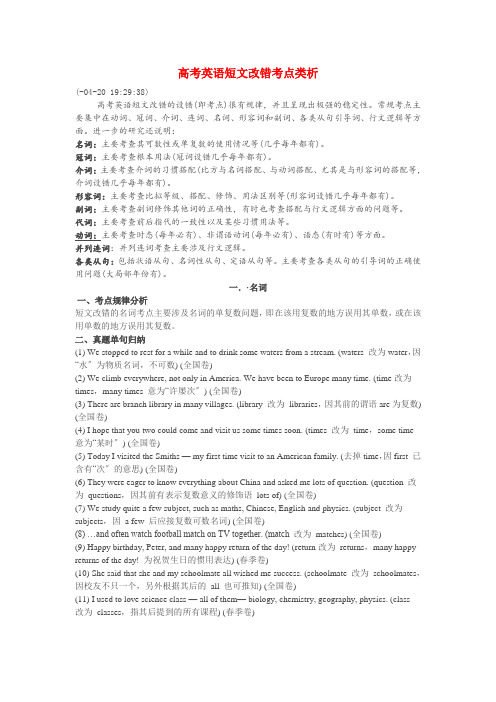
高考英语短文改错考点类析(-04-20 19:29:38)高考英语短文改错的设错(即考点)很有规律,并且呈现出极强的稳定性。
常规考点主要集中在动词、冠词、介词、连词、名词、形容词和副词、各类从句引导词、行文逻辑等方面。
进一步的研究还说明:名词:主要考查其可数性或单复数的使用情况等(几乎每年都有)。
冠词:主要考查根本用法(冠词设错几乎每年都有)。
介词:主要考查介词的习惯搭配(比方与名词搭配、与动词搭配、尤其是与形容词的搭配等,介词设错几乎每年都有)。
形容词:主要考查比拟等级、搭配、修饰、用法区别等(形容词设错几乎每年都有)。
副词:主要考查副词修饰其他词的正确性,有时也考查搭配与行文逻辑方面的问题等。
代词:主要考查前后指代的一致性以及某些习惯用法等。
动词:主要考查时态(每年必有)、非谓语动词(每年必有)、语态(有时有)等方面。
并列连词:并列连词考查主要涉及行文逻辑。
各类从句:包括状语从句、名词性从句、定语从句等。
主要考查各类从句的引导词的正确使用问题(大局部年份有)。
一.·名词一、考点规律分析短文改错的名词考点主要涉及名词的单复数问题,即在该用复数的地方误用其单数,或在该用单数的地方误用其复数。
二、真题单句归纳(1) We stopped to rest for a while and to drink some waters from a stream. (waters 改为water,因“水〞为物质名词,不可数) (全国卷)(2) We climb everywhere, not only in America. We have been to Europe many time. (time改为times,many times 意为“许屡次〞) (全国卷)(3) There are branch library in many villages. (library 改为libraries,因其前的谓语are为复数) (全国卷)(4) I hope that you two could come and visit us some times soon. (times 改为time,some time 意为“某时〞) (全国卷)(5) Today I visited the Smiths — my first time visit to an American family. (去掉time,因first 已含有“次〞的意思) (全国卷)(6) They were eager to know everything about China and asked me lots of question. (question 改为questions,因其前有表示复数意义的修饰语lots of) (全国卷)(7) We study quite a few subject, such as maths, Chinese, English and physics. (subject 改为subjects,因a few 后应接复数可数名词) (全国卷)(8) …and often watch football match on TV together. (match 改为matches) (全国卷)(9) Happy birthday, Peter, and many happy return of the day! (return改为returns,many happy returns of the day! 为祝贺生日的惯用表达) (春季卷)(10) She said that she and my schoolmate all wished me success. (schoolmate 改为schoolmates,因校友不只一个,另外根据其后的all 也可推知) (全国卷)(11) I used to love science class — all of them— biology, chemistry, geography, physics. (class改为classes,指其后提到的所有课程) (春季卷)(12) They did not want me to do any work at family. (family 改为home,因at home 为固定短语) (全国卷)(13) …so that I’ll get good marks in all my subject. (subject 改为subjects,请注意前面的all) (全国卷)(14) On the way up I was busy taking picture since the scenery was so beautiful. (picture 改为pictures,picture 作为可数名词,其前应有限定词,或为复数形式) (全国卷)(15) No one worries much about the radio program young people listen to. (program 改为programs,从句意上看,此处应用复数) (春季卷)(16) Their word were a great encouragement to me. (word 改为words,注意其后的复数动词) (全国卷)(17) You know, that was a dinner we had waited for several month.〞(month 改为months,因several 后要用可数名词的复数形式) (卷)(18) …but after class we become stranger at once.(stranger改为strangers,由本行前面的we 可知应该用名词复数) (全国卷)(19) You can find all kinds of information in just a few minute on the Internet. (minute改为minutes,因为a few后面的名词一定是复数) (卷)(20) Nowadays millions of people of all age take pleasure in a hobby…(age改为ages,因谈到不止一个人的年龄,age用复数;of all ages指各个年龄阶段的人(卷)(21) She was doing her homeworks one Sunday morning when… (homew orks改为homework,因它是不可数名词,没有复数形式) (卷)(22) Without enough knowledges, you can never teach well. (knowledges改为knowledge,因knowledge是不可数名词,没有复数形式) (卷)二.高考英语短文改错考点类析•冠词一、考点规律分析短文改错对冠词的考查主要涉及冠词的误加和漏用,有时也考查不定冠词与定冠词以及零冠词的用法区别(包括 a 与an 的区别)。
(word完整版)高考英语短文改错最全套路,文档

2021 年高考英语短文改错最全套路一、短文改错全能公式1.谓语动词的错误是历年考试的重点和热点,常有动词错误种类有:①一般现在时与一般过去时错用;② and前后动词时态不一致;③主谓不一致;④缺少动词 ,特别是 be 动词 ;⑤第三人称单数形式错用 ;⑥主动语态和被动语态错用。
2.名词的常有错误:单复数名词错用,可数名词与不能数名词错用。
3.连词错误:连词包括关系代词、副词,并列连词 and/or/but等。
关于连词,一般观察从句关系:who/whom/whose/what/which/how/why/when/where/if/whether等。
4.冠词错误:误用 a 和 an( 依照单词的第一个音素来判定 );误用 a/an和the(固定搭配,或泛指、特指;多冠词或少冠词)5.形容词和副词错误:系动词后用形容词 (be/am/is/are/was/were/become/go/感官性动词smell/feel);词性的误用 (形容词修饰名词 ;副词修饰动词、形容词 )。
6.代词错误:代词的主格和宾格 (I/me;he/him;she/her;we/us they/them)错误;反身代词 (myself/yourself/himself/herself/themselves/ourselves)使用错误;代词的单数和复数使用错误;代词指代错误;多代词或少代词。
7.非谓语动词的常有错误:不定式、动名词作主语、宾语时;and 连接的不定式或动名词前后不一致 ( 特别距离较远时 );介词后用动名词形式作宾语;某些动词后要求接动名词或不定式。
8.介词错误:词组中的介词误用;介词意思理解偏差;介词的多用或少用二、短文改错解答口诀动词形,名词数;注意形和副;非谓动词细区分;习惯用法要记住;句子成分多解析;逻辑错误须关注。
1、动词形主要包括两类错误:动词的时态和语态错误,以及主、谓不一致的错误。
比方: My favourite sport is football. I was member of our school football team.Now my picture and prize is hanging in the library. (are)上述两例分别属于时态错误和主、谓不一致错误。
英语短文改错题的常见考点

英语短文改错题的常见考点短文改错题所设置的错误主要有语法错误和逻辑错误两种,并以语法错误为主。
错误的呈现方式有多词/少词和缺词三种。
多词主要出现在冠词/介词/连词/助动词。
少词主要出现在名词前少冠词,不及物动词或固定结构中少介词,缺少助动词或不定式符号或连词等。
错词主要出现在冠词/介词/连词/名词的单复数/动词的时态及语态/非谓语动词/主谓一致或词类误用等。
现将常见的短文改错题考点及近三年的高考题实例呈现如下;第一部分,与动词相关的考点(一)谓语(1)错误使用时态1、Last summer I go to America and studied at a language school.2. It is five years now since I graduate from No.3 High School.3. Last winter vacation, some of my classmates decide to travel with their friends.4. When they came home, I will show them around my university and the city just as well.5. I grow up in this village, so I know everyone here.6. “Let`s got some more” I said.7.We had to sit at our desks in silence and paid attention to what the teacher were saying.(2)主谓不一致1. One day, while my friend and I was traveling through Germany.2.John Brown is a London taxi driver who love going to the theatre.3.With such stories it make people think about life.4.Both my parents miss you a lot. So do our friend, Cathy.5.The pay were 10 cents per envelope.6.But as soon as the kangaroo were free, it jumped up and ran away with the jacket.7.There is a public library in every town in Britain. Anyone can borrow books if he or she wish.8.He looked up at us and said‘I just want to know what the sign say”.9.Mary together with her two brothers are watching TV.10.I am sure I am not the only fan who want to know things about you.(3)上下文时态不一致1 .When he gets home ,he saw the animal waiting at the door.2.One day in the restaurant where I worked, I am serving a table o f…3.I left school as soon as I can and started work.4.In Grade Eight I took physics.In one test I get only 36 percent…6.We had guests last night who have not stayed in a hotel ago.7.I gained so much confidence that I go back to school as a new person.8.When our six children were young, suppertime is always being interrupted by neighborhood childre n…(4)主被动语态错用1.We hung a sign on the front door that was read “we`re having dinner, come back later.”2.Today, I got a letter that said I had been admitting to a college.3.One day, the school held party, where I invited to talk about Tianjin.4.If I have the honor to be chose to work for the 29th Olympic Games.5.Many high buildings have been appeare d…6.He permitted to retake the test, and I was pulled my grade to an A.(二)非谓语使用错误1.My father was so pleasing that he suggested I go to England for a holiday.2.I`d like to staying there for a month.3.I have often dreamed of talk face to face with you.4.I will do my best to help making the Games a success.5.Which took us a long time prepare.6.We all enjoyed this precious day greatly ,remember the time we spent together.7.And there were many meaningful things that are worth think of.8.We`d better not to miss the chance to enjoy it.9.Surrounding by a group of students, the old professor felt very happy.10.My parents have agreed to visiting me.11.Perhaps someone who wanted see the play would take them.12.Though I had difficulty walk back to my classroom.13.Even the heavy rain in the morning could not prevent us go.14.I want to thank you for helping me becoming a different person.15.We usually work only five hours a day, so we will have plenty of spare time visit the area.第二部分其他常考词类(一)名词名词在改错题中常见的考点是单复数误用和名词所有格运用错误。
高考英语短文改错考点归纳
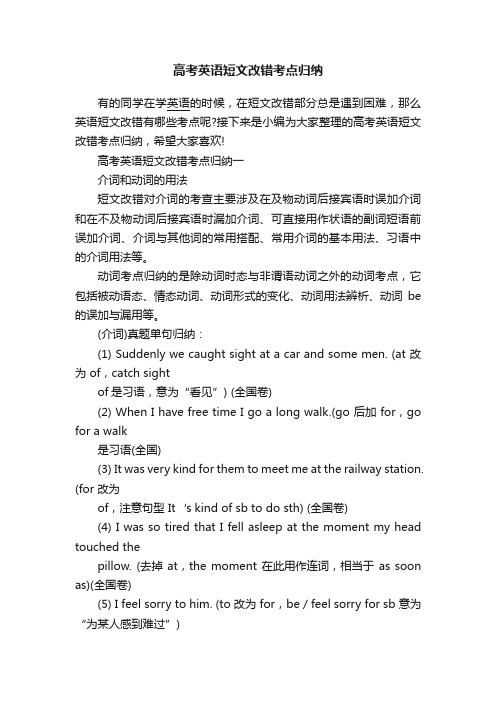
高考英语短文改错考点归纳有的同学在学英语的时候,在短文改错部分总是遇到困难,那么英语短文改错有哪些考点呢?接下来是小编为大家整理的高考英语短文改错考点归纳,希望大家喜欢!高考英语短文改错考点归纳一介词和动词的用法短文改错对介词的考查主要涉及在及物动词后接宾语时误加介词和在不及物动词后接宾语时漏加介词、可直接用作状语的副词短语前误加介词、介词与其他词的常用搭配、常用介词的基本用法、习语中的介词用法等。
动词考点归纳的是除动词时态与非谓语动词之外的动词考点,它包括被动语态、情态动词、动词形式的变化、动词用法辨析、动词be 的误加与漏用等。
(介词)真题单句归纳:(1) Suddenly we caught sight at a car and some men. (at 改为 of,catch sightof是习语,意为“看见”) (全国卷)(2) When I have free time I go a long walk.(go 后加 for,go for a walk是习语(全国)(3) It was very kind for them to meet me at the railway station. (for 改为of,注意句型It‘s kind of sb to do sth) (全国卷)(4) I was so tired that I fell asleep at the moment my head touched thepillow. (去掉 at,the moment 在此用作连词,相当于 as soon as)(全国卷)(5) I feel sorry to him. (to 改为 for,be / feel sorry for sb 意为“为某人感到难过”)(动词)真题单句归纳(1)Books may be keep for four weeks. (keep 改为 kept,因此处要用被动语态(全国)(2) They eager to know everything about China and asked me lots ofquestions. (eager 前加were,因此处缺谓语动词) (全国卷)(3) I‘d like to your pen-friend, and get to know more about your country.(to 后加 be / become,因 would like后要接不定式,根据句意此处应加 be / become)(全国卷)(4) There will an important game next month. (will 后加be,此处缺谓语动词)(5)We were all left home at an early age.(去掉were,因句中已有谓语动词left,“我们离开家”又是主动,不能再加be) (天津卷)高考英语短文改错考点归纳二代词考点1、定语从句中的名词已由关系代词取代,再用代词则是多余的。
高考英语短文改错考点解析 介词
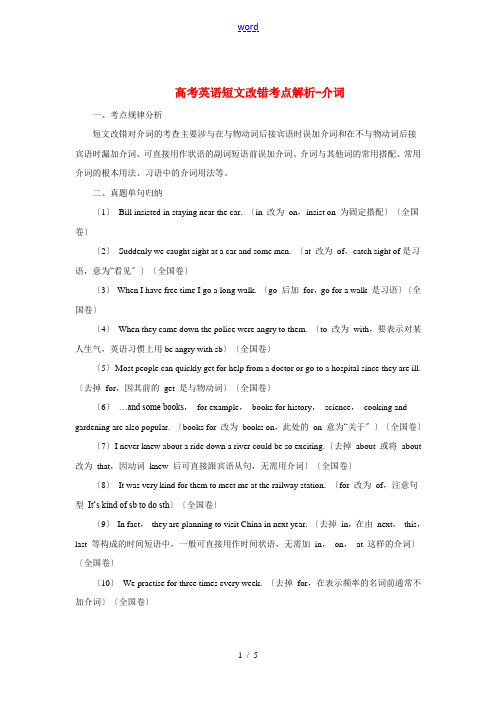
高考英语短文改错考点解析-介词一、考点规律分析短文改错对介词的考查主要涉与在与物动词后接宾语时误加介词和在不与物动词后接宾语时漏加介词、可直接用作状语的副词短语前误加介词、介词与其他词的常用搭配、常用介词的根本用法、习语中的介词用法等。
二、真题单句归纳〔1〕Bill insisted in staying near the car. 〔in 改为on,insist on 为固定搭配〕〔全国卷〕〔2〕Suddenly we caught sight at a car and some men. 〔at 改为of,catch sight of是习语,意为“看见〞〕〔全国卷〕〔3〕When I have free time I go a long walk. 〔go 后加for,go for a walk 是习语〕〔全国卷〕〔4〕When they came down the police were angry to them. 〔to 改为with,要表示对某人生气,英语习惯上用be angry with sb〕〔全国卷〕〔5〕Most people can quickly get for help from a doctor or go to a hospital since they are ill. 〔去掉for,因其前的get 是与物动词〕〔全国卷〕〔6〕…and some books,for example,books for history,science,cooking and gardening are also popular. 〔books for 改为books on,此处的on 意为“关于〞〕〔全国卷〕〔7〕I never knew about a ride down a river could be so exciting. 〔去掉about 或将about 改为that,因动词knew 后可直接跟宾语从句,无需用介词〕〔全国卷〕〔8〕It was very kind for them to meet me at the railway station. 〔for 改为of,注意句型It‘s kind of sb to do sth〕〔全国卷〕〔9〕In fact,they are planning to visit China in next year. 〔去掉in,在由next,this,last 等构成的时间短语中,一般可直接用作时间状语,无需加in,on,at 这样的介词〕〔全国卷〕〔10〕We practise for three times every week. 〔去掉for,在表示频率的名词前通常不加介词〕〔全国卷〕〔11〕We must keep in mind that we play for the team instead ourselves. 〔instead 后加of,instead of 为复合介词,在此表示“而不是〞〕〔全国卷〕〔12〕Unfortunately,there are too many people among my family. 〔among 改为in,in my family 意为“在我家里〞〕〔全国卷〕〔13〕I was happy with any programme but the others spent a lot time arguing…〔a lot 后加of,因 a lot 不能直接修饰名词〕〔全国卷〕〔14〕Thanks very much on inviting me to your birthday party on Sunday. 〔on 改为for,thanks for doing sth 意为“因某事而感谢某人〞〕〔春季卷〕〔15〕So I‘m really sorry that I won’t be able to come in this time. 〔去掉in,因this time 可直接用作状语〕〔春季卷〕〔16〕…but we do not seem to get m uch time to talk about together. 〔去掉about,因about 后没有接宾语,about 属多余〕〔全国卷〕〔17〕For instance,on one night he played strong and loud music till four o‘clock in the morning. 〔去掉on,因one night 可直接用作状语〕〔春季卷〕〔18〕I was so tired that I fell asleep at the moment my head touched the pillow. 〔去掉at,the moment 在此用作连词,相当于as soon as〕〔全国卷〕〔19〕His parents asked him to spend in more time preparing for the college entrance examination. 〔去掉in,spend 是与物动词,其后可直接跟名词作宾语〕〔安徽春季卷〕〔20〕I feel sorry to him. 〔to 改为for,be / feel sorry for sb 意为“为某人感到难过〞〕〔安徽春季卷〕〔21〕Because so much viewing,children may not develop the habit of reading and the ability to enjoy themselves. 〔Because 后加of,因so much viewing 相当于名词〕〔春季卷〕〔22〕On one year the average child will see 25,000 television commercials…〔On 改为In,意为“在一年中〞〕〔春季卷〕〔23〕The main problem was in that I always thought in Chinese… 〔去掉that 前的in,was 后是一个以that 引导的宾语从句,in 是多余的〕〔全国卷〕〔24〕I‘m sure they will laugh to me and see me as a fool. So I feel unhappy every day. 〔to 改为at,laugh at 意为“嘲笑〞〕〔全国卷〕〔25〕You can find all kinds information in just a few minutes on the Internet. 〔kinds 后加of,a kind of 意为“一种……〞,all kinds of…意为“各种各样的……〞〕〔某某卷〕〔26〕But I have spent lots my money,… 〔lots后加of,lots / a lot后不能接名词;后接名词时,要用lots of…,a lot of…〕〔四川卷〕〔27〕…you will probably want to join in the Stamp Collectors‘ Club…〔去掉in,表示“参加,参加〞某个组织,join 后不要再加介词in;表示“参加〞某项活动时,才加in〕〔浙江卷〕〔28〕We have a lot on common and have a lot to talk about. 〔on 改为in,因为have sth in common 是固定搭配,意为“有共同的……〞〕〔福建卷〕三、模拟单句演练〔1〕We must serve for the people heart and soul.〔2〕I followed the man for a while,and saw him enter into the bank.〔3〕Soon the nurse married with my friend Jim.〔4〕I took a great many of photographs in the mountains.〔5〕In English class,we often talk each other in English.〔6〕Don‘t talk. What the man says is well worth listening.〔7〕The chair looks hard,but it is comfortable to sit.〔8〕She was very kind and insisted lending her car to us.〔9〕I asked to her what she would be doing on Saturday.〔10〕Are you glad to be going to back to school?〔11〕On his way to home,he met one of his old friends Jack.〔12〕Please close the door at next time you come in.〔13〕Thousands of people go to the seaside in every year.〔14〕We can finish the work either this week or in next week.〔15〕We walked down the stairs instead taking the elevator.〔16〕We could not have heard them because the noise from the river.〔17〕Don‘t be angry to me for not having written—I was really too busy.〔18〕I‘ve read a lot books about animals.〔19〕He invited us to dinner,which was very kind for him.〔20〕I knew that there was no hope on the moment I saw him.〔21〕Don‘t go by plane. It’s a lot of more expensive.〔22〕Except milk and cheese,we all need vegetables.〔23〕On my way back,I called at Mr Smith at his office.「参考答案」〔1〕去掉for,serve 表示“为……服务〞,是与物动词,后接宾语时无需用介词。
(完整版)高考短文改错知识点总结
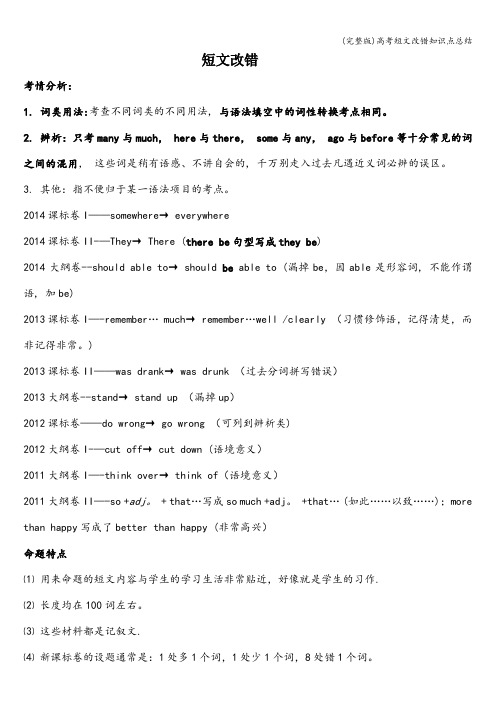
短文改错考情分析:1. 词类用法:考查不同词类的不同用法, 与语法填空中的词性转换考点相同。
2. 辨析:只考many与much, here与there, some与any, ago与before等十分常见的词之间的混用,这些词是稍有语感、不讲自会的, 千万别走入过去凡遇近义词必辨的误区。
3. 其他:指不便归于某一语法项目的考点。
2014课标卷I——somewhere→ everywhere2014课标卷II-—They→ There (there be句型写成they be)2014大纲卷--should able to→ should be able to (漏掉be,因able是形容词, 不能作谓语, 加be)2013课标卷I—-remember… much→remember…well /clearly (习惯修饰语,记得清楚,而非记得非常。
)2013课标卷II——was drank→ was drunk (过去分词拼写错误)2013大纲卷--stand→ stand up (漏掉up)2012课标卷——do wrong→ go wrong (可列到辨析类)2012大纲卷I-—cut off→ cut down (语境意义)2011大纲卷I—-think over→ think of(语境意义)2011大纲卷II—-so +adj。
+ that…写成so much +adj。
+that… (如此……以致……);more than happy写成了better than happy (非常高兴)命题特点⑴用来命题的短文内容与学生的学习生活非常贴近,好像就是学生的习作.⑵长度均在100词左右。
⑶这些材料都是记叙文.⑷新课标卷的设题通常是:1处多1个词,1处少1个词,8处错1个词。
5. 要求考生添加或删除的词通常是虚词.⑴少了一个词,要求添加的词有:①冠词:in countryside →in the countryside(2015课标I)As result→ As a result(2014课标I)②介词:listening music→ listening to music(2014课标II)③连词:He had…, he was… →He had…, and he was(2013课标I)④不定式符号:came see me→ came to see me(2007课标)⑤物主代词:Tom saw parents→ Tom saw his parents(2015课标II)⑵多了一个词,要求删除的词有:介词、冠词、连词、助动词、不定式符号to。
(完整版)高考英语短文改错整理版word
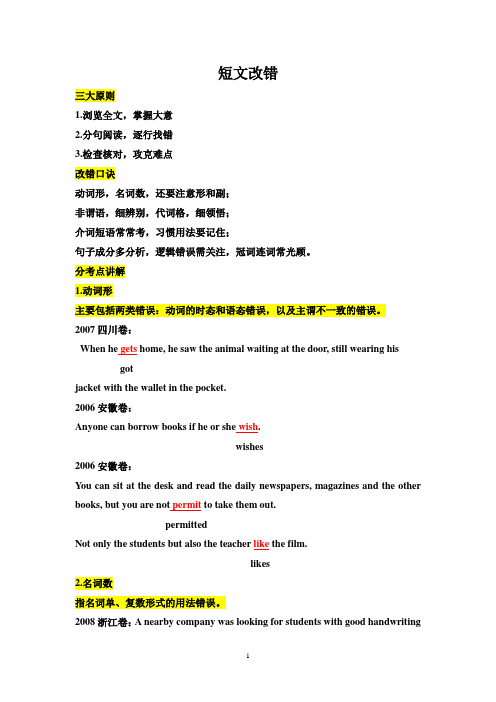
短文改错三大原则1.浏览全文,掌握大意2.分句阅读,逐行找错3.检查核对,攻克难点改错口诀动词形,名词数,还要注意形和副;非谓语,细辨别,代词格,细领悟;介词短语常常考,习惯用法要记住;句子成分多分析,逻辑错误需关注,冠词连词常光顾。
分考点讲解1.动词形主要包括两类错误:动词的时态和语态错误,以及主谓不一致的错误。
2007四川卷:When he gets home, he saw the animal waiting at the door, still wearing his gotjacket with the wallet in the pocket.2006安徽卷:Anyone can borrow books if he or she wish.wishes2006安徽卷:You can sit at the desk and read the daily newspapers, magazines and the other books, but you are not permit to take them out.permittedNot only the students but also the teacher like the film.likes2.名词数指名词单、复数形式的用法错误。
2008浙江卷:A nearby company was looking for students with good handwritingto write addresses on envelope .The pay were 10 cents per envelope.envelopes2006陕西卷:They have all sorts of course. I’m sure you will find one you like.courses2006重庆卷:In summer, the sea under the blue skies is even more beautiful.sky3.还要注意形和副注意形容词和副词在句子中的作用和具体用法。
英语高考短文改错知识点

英语高考短文改错知识点一、概览短文改错是英语高考中的常见题型之一,对考生的语法和词汇理解能力有一定的要求。
本文将介绍一些常见的短文改错知识点,以便考生们在备考中能够有针对性地进行复习。
二、词性转换在短文改错中,常会涉及到对词性的转换。
例如,将形容词转化为副词、名词转化为形容词等。
在改错时,考生应特别注意上下文的语法合理性。
例句1:He speaks English good.改正:He speaks English well.例句2:I did my home-work careful.改正:I did my homework carefully.三、冠词使用冠词在短文改错中也是常见的错误点之一。
考生应根据词汇搭配和语法规则的要求,正确使用冠词。
例句1:I want a orange.改正:I want an orange.例句2:He is best teacher in our school.改正:He is the best teacher in our school.四、时态和语态时态和语态是短文改错中较容易出错的地方。
考生应注意上下文的时态一致,并根据需要正确使用主动语态和被动语态。
例句1:I meet my friend at the supermarket yesterday.改正:I met my friend at the supermarket yesterday.例句2:The letter was send by him last week.改正:The letter was sent by him last week.五、单复数形式单复数形式的使用也是短文改错中常见的难点之一。
考生需要根据上下文的要求和词语本身的规则,选择正确的单复数形式。
例句1:She have two cats and three dogs.改正:She has two cats and three dogs.例句2:There is many books on the shelf.改正:There are many books on the shelf.六、固定搭配固定搭配在短文改错中占有重要的比例,考生需要熟悉常见的搭配,以免出现错误。
高考英语·短文改错·考点与套路(完整校验版)

高考英语·短文改错·考点与套路〔完整校验版〕Part 1 考点规律1. 错词考点一、虚词选择错误①介词或副词选择错误:这种情况极为复杂,各种情况都有可能。
这里只提供几组作为参考:before / ago, among / between, after / in, below / under, on / above / over, across / through, except / besides, with / in(用), to / for (对于), like / as 等。
②连词选择错误或连词与介词混淆。
如:because / for(since, as), if / whether, if / unless, so as / so that, hardly …when / no sooner…than, while / when, till / until等。
③关系词选择错误:who/whom/whose,Which/that,what/which(that),(介词+)whom(which)/that,(it is...)that/when/where/how等。
④感慨词选择错误:how/what。
⑤代词选择错误:人称代词的格,如:l/me/my/mine。
人称代词与反身代词,如:I (me)/myself。
先行词it〔作主语或宾语〕与指示代词:it/that(this)。
不定代词与限定词:some/any, no/none/no one( nobodv), every/each, everyone/every one, aIVboth, any/either, none/neither, few/little, many/much, other/others/another. other/else, so/such(…that)等。
⑥冠饲选择错误:a/an,a(n)/the。
- 1、下载文档前请自行甄别文档内容的完整性,平台不提供额外的编辑、内容补充、找答案等附加服务。
- 2、"仅部分预览"的文档,不可在线预览部分如存在完整性等问题,可反馈申请退款(可完整预览的文档不适用该条件!)。
- 3、如文档侵犯您的权益,请联系客服反馈,我们会尽快为您处理(人工客服工作时间:9:00-18:30)。
高考英语短文改错介词考点介词是一种用来表示词与词、词与句之间的关系的虚词,在句中不能单独作句子成分。
介词后面一般有名词、代词或相当于名词的其他词类,短语或从句作它的宾语。
介词和它的宾语构成介词词组,在句中作状语、表语、定语或宾语补足语。
介词可分为时间介词、地点介词、方式介词、原因介词和其他介词。
①Nothing in the world could live without air or water.(状语 )①This machine is in good condition.表(语 )①Where is the key to my bike?(定语 )①She always thinks herself above others(.宾补)一、介词的分类(1)从用法分类介词类型例词例句表示方位at, before, behind, below, etc.There must be something behind it.表示时间about, after, at, before, by, etc. He came home after 3 days.表示原因、目的for, with, from, etc. He died from cancer.表示对于to, for, over, at, with, etc. The book is really difficult for me.表示手段、方式by, in, with, etc. I will defend the motherland with my life.表示除去but, besides, except, etc. We all went to the supermarket except Tom.表示比较as, like, above, over, than, etc. They united as one man.表示结果to, with, without, etc. Man can’t live without water.(2)从结构分类介词分类构成例词简单介词只有单独一个after, at, on, in, during, since, till, across, over, through, past,词的介词near, to, above, by, for, down, from, of, off, behind, below,beneath, beside, between, beyond, up, with, about, against,along, among, around, etc.复合介词由两个单词合成的介词into, inside, onto, outside, throughout, towards, upon, within, without, etc.形容词,分词或副词 +介词according to, away from,owing to, etc.down to, inside of, near to, opposite to,连词 +介词as for, as to, because of, etc.介词 + 介词 ( 又称 from among, from behind, from under, till after, in between, etc.短语介词双重介词 )介词 +名词 +介词by means of, in front of, in spite of, on account of, with regard to, etc.其他thanks to, etc.分词concerning, considering, including, regarding, etc.形容词或副词like, near, opposite, round, next, etc.由其他词类than, but(除⋯⋯之外 ), etc.连词转用despite(不顾;不管 ), etc.名词【考点一】考查with/without 复合结构介词 with/without+ 名词 /代词 +形容词 /副词 /介词短语 /动词不定式 /分词(分词可以是现在分词,也可以是过去分词)在句中表状态或说明背景情况,常作伴随、方式、原因、条件等状语。
With all the things she needed bought, she went home happily.Possibly this person died without anyone knowing where the coins were hidden.单项填空①It was a pity that the great writer died _____ his works unfinished.A. forB. withC. fromD. of解析:选 B。
考查 with 复合结构。
works 与 unfinish 之间为动宾关系,所以用过去分词表示被动。
如果名词或代词与后面的动词是主谓关系,则用现在分词表示主动。
【考点二】考查工具、手段、方式介词(1)by, in, on 三词都可表示旅行的方式①不涉及交通工具的名词时用by,名词前不加冠词。
如by sea, by water, by land, by rail, by air等。
①涉及交通工具的名词时用by,名词须用单数形式,前面不加冠词或任何修饰语。
如 by bike, by taxi, by plane, by ship/boat, by train, by spaceship等。
①当旅行方式涉及确定特指的交通工具时,用on 或 in,名词前加冠词、物主代词、指示代词等修饰语。
如 travel to New York in this plane, leave on an early train, go to school on my bike 等。
注意:步行、骑马、骑骆驼均用on。
如 on foot,on horseback,on a horse,on the camel。
(2)with, by, in 三词均意为“用”,表示行为的工具、手段或方式。
① with 用于有形的工具或身体某些器官之前,其后的名词多被冠词、物主代词等修饰。
They are digging with a pick/spade.We see with our eyes, hear with our ears, and walk with our legs.① by, in, on, over, through 等介词多用于无形的工具或方式手段之前。
如by hand, in ink, on the telephone, over the radio, through the telescope等。
注意:①使用语言、原料、材料时,用in 表示,如 in English/Japanese;in blue ink 等。
①表达“用⋯⋯方法 /式”时,所用介词有: in this/that/the same way,by means of,by this/that means,with this/that method 等。
【考点三】考查of+抽象名词的用法“ of+抽象名词”的用法与形容词相同,在句中可作表语、定语、补语。
of+great/much +抽象名词 =very+名词的形容词形式of+no+抽象名词 =not+名词的形容词形式It is of great value.=It is very valuable.It is of no use.=It is useless.The camel is of great help to the Arab.=The camel is very helpful to the Arab.【考点四】考查表示程度的介词by, to, beyondby 表示“增加了⋯⋯”; to 表示“增加到⋯⋯”; beyond 表示“范围 , 限度超出”。
This new model of car is so expensive that it is beyond the reach of those with average incomes.单项填空① Sorry, Madam. You A. during ’ d better come tomorrow because it ’ s ______ the visiting hours. B. at C. beyond D. before解析:选 C。
考查介词的用法。
句意为:对不起,女士,你最好明天来,因为已经过了开放时间了。
beyond(时间)晚于,迟于。
【考点五】考查介词but 的固定搭配have no choice but to do 只得做某事; can’ t help but do不得不做⋯⋯; can’ t but do不得不只能;can’ t choose but do只得做某事; but for 要不是⋯⋯。
I have no choice but to accept his conditions.There was no taxi that day, I couldn another’ t choose but stay there fornight.【考点六】考查to one ’情s+感类名词to 与情感类名词连用,表示“某人因某事的发生而唤起其内心的某种情感”。
常见的结构有:to+one’s+delight/surprise/horror/sorrow/joy/regret= to the delight/surprise/horror/sorrow/joy/regret of sb.。
这种结构表示结果,用作状语,通常置于句首,也可置于句中或句末。
若要加强该结构的语气,有两种方式:①在名词前加 great, deep等形容词修饰;①在整个短语前加副词greatly, much 等修饰。
To his disappointment, he failed again.【考点七】考查名词与to 构成的固定搭配key, approach, solution, answer, entrance, visit, attitude等与to构成固定搭配:the key/approach/solution/answer/entrance/visit/attitude to...。
It is said that they have adopted a new approach to teaching English.【考点八】考查介词by 的用法(1)by+地点名词。
